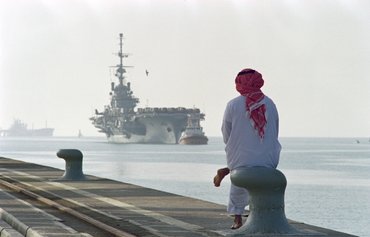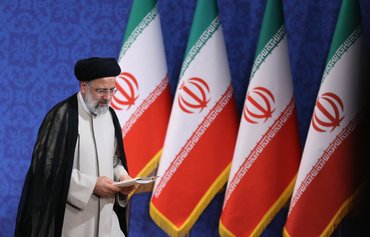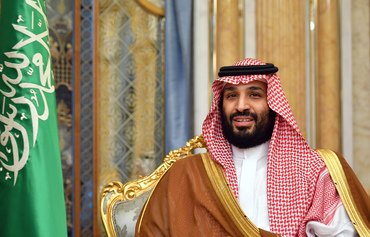Saudi Arabia's location, natural resources and importance in Islam make it a pivotal ally in the Middle East, without which no country or political force can gain influence in the region, analysts say.
It serves as "the heart of the Islamic world because of the presence of the holy cities of Mecca and Medina", said Fadel al-Hindi, supervisor at King Abdulaziz University's Centre for Social Research and Humanities.
"The kingdom has a great additional power that is added to its economic power, as most issues in the Middle East are linked in one way or another to religion," he said.
Saudi Arabia is "the cradle of Islam", said Faisal al-Khawaldi, a lecturer at the Jeddah-based university's faculty of economics and administration.
![Saudi Arabia's King Abdullah Port on the Red Sea coast north of Jeddah is seen here in an undated photo. [Saudi Press Agency]](/cnmi_di/images/2021/06/25/30491-Saudi-oil-photo-600_384.jpg)
Saudi Arabia's King Abdullah Port on the Red Sea coast north of Jeddah is seen here in an undated photo. [Saudi Press Agency]
![A billboard displaying an advert for Aramco is pictured in Riyadh on November 10, 2019. [Fayez Nureldine/AFP]](/cnmi_di/images/2021/06/25/30492-Saudi-Aramco-billboard-600_384.jpg)
A billboard displaying an advert for Aramco is pictured in Riyadh on November 10, 2019. [Fayez Nureldine/AFP]
Millions of Muslims from around the world travel to the kingdom each year to perform the hajj and umrah, he said.
From a geopolitical perspective, he added, its "abundance of natural resources makes it an economic and political force".
"It has a quarter of the world's oil reserves, ranks first in the production and export of petroleum products, and is the largest free market economy in the Middle East and North Africa", al-Khawaldi said.
It is one of the world's richest countries, he said, ranking high on many global economic and financial indicators and indices.
The kingdom's economic power "boosted its political and diplomatic strength in the region and made it an essential and strategic ally for any country that aspires to strengthen its influence in the region", he noted.
Barrier to infiltrators
In addition to its economic strength, Saudi Arabia's sheer size and geographic position play a key role in its political power, said Abdullah al-Dakhil, a lecturer in political science at King Saud University in Riyadh.
It occupies almost three-quarters of the Arabian Peninsula and is the largest Arab country in the Middle East and the second largest Arab country overall, after Algeria, he noted.
The kingdom shares borders with Iraq, Kuwait, Jordan, Qatar, the United Arab Emirates, Oman and Yemen, he said.
In also "has a coast on the Red Sea, which shortens the distance between it and Egypt, not to mention its strategic location in the Arabian Gulf region, making it a mandatory intersection with the region's policies", he said.
The kingdom's location, religious history and social connections "make it the principal country in the region that is impossible to surmount by any country or political regime that tries to infiltrate the region".
Saudis have "tribal, clan and historical ties with the residents of surrounding countries, which is reflected in the kingdom's political and diplomatic relationships", said al-Hindi of King Abdulaziz University.
Key role in international coalition
The kingdom has played a key role in the international coalition against the "Islamic State of Iraq and Syria" (ISIS) and has taken a stand against extremism on a national and international level.
It co-chairs the international coalition's working group that focuses on combating ISIS financing with the United States and Italy, co-hosting its 14th meeting via video conference on May 17 and 18.
The Royal Saudi Air Force conducted 341 sorties in support of international coalition air strikes in Syria, and Saudi forces also participated in a number of joint military team initiatives, according to the international coalition.
Additionally, the kingdom has worked to counter extremist messaging and propaganda, establishing a number of centres, including the Terrorist Financing Targeting Centre (TFTC), that work to mitigate the extremists' impact.
Created in May 2017, the TFTC includes Bahrain, Kuwait, Oman, Qatar, the United Arab Emirates and the United States.
In addition to going after ISIS's media machine, the group has sanctioned entities associated with Iran's Islamic Revolutionary Guard Corps (IRGC) and Lebanon's Hizbullah.
The TFTC has imposed sanctions on Taliban operatives and their Iranian backers who have sought to "undermine the security of the Afghan government".

![Muslims perform the Eid al-Fitr morning prayer at the Grand Mosque in the holy city of Mecca on May 13 to mark the end of Ramadan. [Abdulghani Essa/AFP]](/cnmi_di/images/2021/06/25/30490-Mecca-Grand-Mosque-600_384.jpg)






